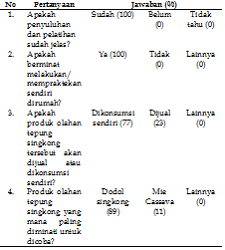Pemberdayaan Masyarakat Melalui Pengolahan Singkong menjadi Bahan Baku Produk Olahan Makanan di Desa Tarung Manuah, Kecamatan Basarang, Kabupaten Kapuas Community Empowerment through Processing Cassava into Raw Materials for Processed Food Products in Tarung Manuah Village, Basarang District, Kapuas Regency
Main Article Content
Abstract
Cassava is a type of plant that is easy to grow in various types of soil, and its cultivation method is relatively easy. The stems, leaves, and tubers of cassava have various benefits for human life. Limited knowledge and skills regarding the diversification of cassava-based processed products are an obstacle for which solutions must be sought. The purpose of this service activity is to empower the community, especially partners/target groups, through training on processing cassava into raw materials for processed food products. Community service activities carried out using training/mentoring and demonstrations/practices are one of the solutions that can be carried out for community empowerment. The results of community service activities show that all participants (100%) can actively participate in receiving all the knowledge and skills transferred and are interested in doing it themselves at home (100%). Processed products in the form of cassava flour will be consumed by themselves (77%) and sold (23%) with processed food products of cassava lunkhead (89%) and cassava noodles (11%), which were of high interest. This data shows that community service activities carried out by Palangka Raya University can contribute and become a solution to overcome problems faced by the community.
Downloads
Article Details
Authors who publish with this journal agree to the following terms:
- Any article on the copyright is retained by the author(s).
- Author grant the journal, right of first publication with the work simultaneously licensed under a Creative Commons Attribution License that allows others to share work with acknowledgment of the work authors and initial publications in this journal.
- Authors are able to enter into a separate, additional contractual arrangements for non-exclusive distribution of published articles of work (eg, post-institutional repository) or publish it in a book, with acknowledgment of its initial publication in this journal.
- Authors are permitted and encouraged to post their work online (e.g., in institutional repositories or on their websites) prior to and during the submission process, as can lead to productive exchanges, as well as earlier and greater citation of published work.
- The article and any associated published material is distributed under the Creative Commons Attribution-ShareAlike 4.0 International License
References
Badan Pusat Statistik Provinsi Kalimantan Tengah. 2019. Provinsi Kalimantan Tengah Dalam Angka 2019. Palangka Raya: Badan Pusat Statistik Provinsi Kalimantan Tengah.
Fardhayanti, D.S., Kusumaningtyas, R.D., Megawati, M., Hartanto, D. 2019. PKM Produksi Tepung Tapioka Maltodekstrin Dan Bioetanol Bagi Kelompok Tani Singkong. Amaliah : Jurnal Pengabdian kepada Masyarakat. 3(1):256-263. https://doi.org/10.32696/ajpkm.v3i1.237
Ginting, E. 2002. Teknologi Penanganan Pascapanen dan Pengolahan Ubikayu Menjadi Produk-Antara untuk Mendukung Agroindustri. Buletin Palawija. 2(4):67-83.
Mulyatun, M. 2019. Pemberdayaan Masyarakat Pesisir Berbasis Potensi Lokal; Alternatif Ketahanan Pangan Berupa Tepung Magrove. Dimas: Jurnal Pemikiran Agama untuk Pemberdayaan. 18(2):211-238. https://doi.org/10.21580/dms.2018.182.3260
Muntoha, M. 2015. Pelatihan Pemanfaatan Dan Pengolahan Singkong Menjadi Makanan Ringan Tela Rasa. AJIE (Asian Journal of Innovation and Entrepreneurship). 4(3):149-154.
Nugraha, H.D., Suryanto, A., Nugroho, A. 2015. Kajian Potensi Produktivitas Ubikayu (Manihot esculenta Crant.) Di Kabupaten Pati. Jurnal Produksi Tanaman. 3(8):673-682.
Pemerintah Kabupaten Kapuas. 2017. Rencana Penyelenggaraan Infrastruktur Jangka Menengah Kabupaten Kapuas Tahun 2017-2021. Kuala Kapuas: Pemerintah Kabupaten Kapuas.
Rosmiati, M., Maulani, R.R., Dwiartama, A. 2018. Efisiensi Usaha Dan Nilai Tambah Pengolahan Ubi Kayu Menjadi Modified Cassava Flour (Mocaf) Pada Kelompok Wanita Tani Medal Asri, Desa Sukawangi Kecamatan Pamulihan Kabupaten Sumedang. 17(1):14-20. http://dx.doi.org/10.5614/sostek.itbj.2018.17.1.2
Rukmana, R. 1997. Ubi Kayu, Budidaya dan Pasca Panen. Yogyakarta: Kanisius.
Santoso, I., Setiawan, B., Pranowo, D. 2015. The Application Of Processing Technology Of Assorted Chips For Optimizing Utilization Potential Local Resources. Journal of Innovation and Applied Technology. 1(1):95-100. http://dx.doi.org/10.21776/ub.jiat.2015.001.01.14
Sutama, I.K., Pugra, I.W., Arjana, I.W.B. 2015. Program IbM Dapat Mengubah Pandangan Masyarakat Selat Karangasem Terhadap Ubi Ungu. BHAKTI PERSADA: Jurnal Aplikasi Ipteks. 1(1):26-37.
